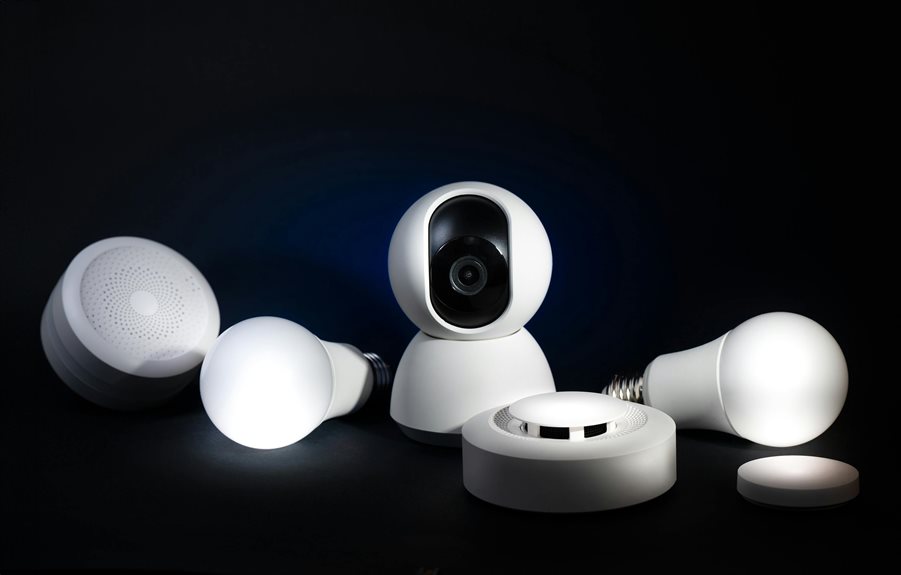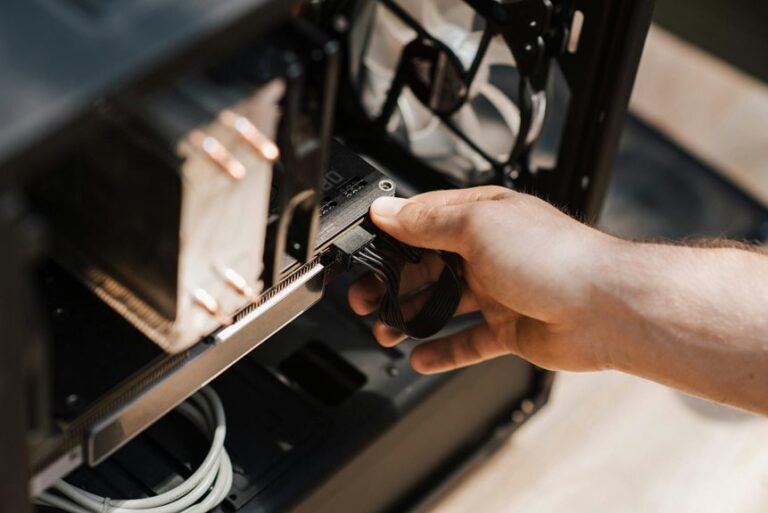When you consider the safety of your business, integrating electrical commercial security systems becomes essential. These systems not only deter potential threats but also streamline your operational efficiency through advanced technologies like surveillance cameras, access control, and alarm systems. You might find it interesting how these components work together to create a thorough security framework that adapts to your specific needs. But what happens when you explore the latest trends and innovations in this field? Understanding these aspects could greatly enhance your approach to safeguarding your assets.
Importance of Security Systems
Security systems are essential in today's commercial landscape, as they consistently protect assets and guarantee the safety of personnel. Implementing these systems allows you to mitigate various risks, including theft, vandalism, and unauthorized access. By using advanced technology, you can monitor premises in real-time, ensuring prompt responses to potential threats.
Investing in security systems enhances your operational efficiency. With integrated surveillance and alarm systems, you can automate monitoring tasks, freeing up human resources for more critical functions. This not only improves productivity but also reduces the likelihood of human error in security management.
Moreover, having robust security measures in place fosters a sense of safety among employees and clients. When personnel feel secure, their morale and productivity improve, directly impacting your bottom line. Additionally, a well-established security presence can deter criminal activities, protecting your business from financial losses.
Finally, compliance with industry regulations often necessitates a certain level of security. By adhering to these standards, you avoid potential legal ramifications and enhance your company's reputation.
In this competitive market, prioritizing security systems isn't just a choice; it's a strategic necessity for sustainable growth.
Types of Electrical Security Systems
When selecting electrical security systems for your commercial space, you'll encounter a variety of options tailored to meet specific needs.
One of the most common types is intrusion detection systems, which utilize motion sensors and door/window contacts to alert you of unauthorized access. These systems can be integrated with alarms that sound when triggers are activated, providing immediate alerts.
Another option is access control systems, allowing you to regulate who enters specific areas of your facility. You can use key cards, biometric scanners, or pin codes to guarantee only authorized personnel gain access.
Fire alarm systems are also essential for commercial properties. These systems detect smoke or heat and can automatically notify emergency services, which is critical for protecting lives and property.
Lastly, perimeter security systems, such as electric fences or barriers, serve to deter intruders before they reach your building.
Combining these systems enhances your overall security strategy, providing thorough protection for your commercial space.
Choosing the right combination of electrical security systems is fundamental to safeguarding your assets and maintaining a secure environment. Assess your specific needs to determine the best setup for your facility.
Surveillance Cameras Overview
Surveillance cameras play an indispensable role in enhancing commercial security by providing real-time monitoring and recorded footage of your premises. These devices come in various types, including fixed, PTZ (pan-tilt-zoom), and IP cameras, each designed to meet specific security needs.
Fixed cameras offer a set view, ideal for monitoring entrances or parking lots, while PTZ cameras allow you to control the direction and zoom, giving you versatility in tracking activity.
When selecting a surveillance system, consider resolution and frame rate. High-definition cameras provide clearer images, which are essential for identifying individuals and events. Additionally, a higher frame rate guarantees smoother video, capturing fast-moving actions effectively.
You should also evaluate night vision capabilities to maintain surveillance in low-light conditions.
Storage solutions are critical for managing recorded footage. Network Video Recorders (NVRs) and cloud storage options allow for efficient data management and accessibility.
Integrating surveillance cameras with your existing security systems enhances overall effectiveness, enabling alerts and real-time response to suspicious activities.
Access Control Solutions
To complement the effectiveness of surveillance systems, access control solutions are essential for managing who can enter your premises and when. These systems allow you to set parameters around access points, ensuring only authorized individuals can gain entry.
You can implement various access control methods, including key card systems, biometric scanners, and mobile access applications. Key card systems offer a straightforward solution, enabling users to swipe cards for entry. Biometric scanners, on the other hand, use unique physical traits like fingerprints or facial recognition for heightened security. Mobile access solutions enable users to gain access to doors via smartphones, adding convenience and flexibility.
Centralized control panels let you monitor and manage access in real-time, making it easy to revoke permissions or track entry logs. Integration with your existing surveillance system enhances overall security, allowing you to cross-reference access data with video footage for thorough incident analysis.
Investing in robust access control solutions not only protects your assets but also streamlines operations by ensuring that only the right people have access to sensitive areas.
Alarm Systems Features
When choosing an alarm system for your commercial space, it's essential to understand the various types available, as each serves different security needs.
You'll want to reflect on key features such as response time, ease of integration with existing systems, and user accessibility.
Identifying these elements will help you select the most effective alarm system for your specific requirements.
Types of Alarm Systems
A variety of alarm systems are available to enhance security in commercial spaces, each designed with specific features to meet diverse needs.
Understanding the types of alarm systems can help you choose the right one for your business.
- Burglar Alarms: These systems detect unauthorized entry through doors or windows, using sensors that trigger alerts when breached.
- Fire Alarms: Essential for safety, these systems monitor smoke and heat levels, alerting you to potential fires and guaranteeing prompt action.
- Environmental Alarms: These systems focus on detecting environmental hazards such as flooding or gas leaks, providing critical alerts to prevent damage and guarantee safety.
- Access Control Systems: These systems regulate entry to restricted areas, using keycards, biometric scans, or PIN codes to guarantee only authorized personnel can access sensitive areas.
Key Features to Consider
Selecting the right alarm system involves more than just understanding the various types available; it requires careful thought of key features that enhance functionality and reliability. When choosing an alarm system for your commercial space, prioritize features that align with your security needs.
Here are some essential features to take into account:
| Feature | Importance |
|---|---|
| Monitoring Options | Choose between self-monitoring or professional monitoring for real-time alerts. |
| Integration Capabilities | Confirm compatibility with other security systems, like cameras and access control. |
| User Access Control | Look for customizable access levels to restrict entry based on roles. |
Additionally, reflect on the ease of use and installation, as well as the system's scalability to accommodate future growth. Battery backup is also significant; it guarantees your system remains active during power outages. By focusing on these key features, you'll enhance your security infrastructure effectively and safeguard your commercial property.
Motion Detection Technology
In understanding motion detection technology, you'll encounter various types of motion sensors, each designed for specific applications.
These detection systems offer significant benefits, enhancing security while minimizing false alarms.
Proper installation and maintenance are essential to guarantee peak performance and reliability of these systems.
Types of Motion Sensors
Motion sensors play an essential role in enhancing security systems by detecting movement within a designated area. Understanding the different types of motion sensors can help you choose the right one for your security needs.
Here are four common types:
- Passive Infrared Sensors (PIR): These sensors detect infrared radiation emitted by warm bodies. They're commonly used in residential and commercial settings due to their reliability and cost-effectiveness.
- Microwave Sensors: Utilizing microwave pulses, these sensors can cover a larger area than PIR sensors. They're ideal for outdoor applications, as they can detect movement through walls and other obstacles.
- Dual-Tech Sensors: Combining PIR and microwave technologies, dual-tech sensors minimize false alarms by requiring both detection methods to trigger an alert. This makes them suitable for environments with pets or fluctuating temperatures.
- Photoelectric Sensors: These sensors use a light beam to detect motion. When the beam is interrupted, an alarm is triggered. They're often used for perimeter security and in areas where traditional sensors may not be effective.
Benefits of Detection Systems
Leveraging detection systems enhances security by providing timely alerts and reducing the risk of unauthorized access. These systems utilize advanced motion detection technology to identify movement in defined areas, allowing you to monitor your premises effectively. When motion is detected, the system triggers immediate alerts via notifications, ensuring you're always informed of potential security breaches.
One notable benefit is the ability to integrate these systems with other security measures, such as cameras and alarms. This creates a thorough security network that not only detects intrusions but also captures visual evidence, enabling swift responses. Additionally, many detection systems can be configured to differentiate between normal activity and suspicious movements, reducing false alarms and ensuring that your attention is directed where it's really needed.
Moreover, detection systems can be remotely monitored through your smartphone or computer, providing you with real-time insights and control over your security environment. This flexibility allows for proactive management of security threats, which can greatly enhance the overall safety of your commercial property.
Installation and Maintenance Tips
When implementing motion detection technology, proper installation and maintenance are key to maximizing its effectiveness. Here are some essential tips to help you guarantee your system operates reliably and efficiently.
- Choose the Right Location: Position sensors where they can effectively cover high-traffic areas. Avoid placing them near heat sources or areas with frequent movement that could cause false alarms.
- Regularly Clean Sensors: Dust and debris can obstruct sensors, reducing their efficiency. Schedule regular cleanings to maintain clear detection pathways.
- Test the System Periodically: Conduct routine tests to verify that the sensors are functioning correctly. This includes checking for proper alignment and responsiveness to movement.
- Update Software and Firmware: Keep your system's software and firmware up to date to take advantage of the latest security features and improvements. Check for updates regularly.
Integration With Smart Technology
As technology continuously evolves, integrating smart technology into electrical commercial security systems has become essential for enhancing safety and efficiency. By incorporating smart devices, you can monitor security in real-time, receive instant alerts, and control systems remotely through your smartphone or computer.
Smart cameras equipped with artificial intelligence can differentiate between authorized personnel and potential threats, reducing false alarms considerably. Additionally, integrating access control systems with biometric technology guarantees that only authorized individuals gain entry, bolstering your overall security measures.
Moreover, incorporating IoT (Internet of Things) devices allows for seamless communication between different security components. For example, if a motion sensor detects unusual activity, it can trigger the cameras to start recording while notifying you instantly. This connectivity enhances your response time and allows for more effective risk management.
Data analytics tools can also be employed to analyze patterns and improve security protocols over time. By utilizing cloud storage, you can access recorded footage anytime, guaranteeing that your data is secure and retrievable.
Ultimately, integrating smart technology into your electrical commercial security systems not only streamlines your operations but also provides a thorough approach to safeguarding your business assets.
Maintenance and Support Services
To guarantee your electrical commercial security systems function at their best, regular maintenance and support services are vital. These services not only help in identifying potential issues before they escalate but also guarantee peak performance and longevity of your systems.
Here are four key components of effective maintenance and support:
- Routine Inspections: Schedule periodic checks to assess the functionality of cameras, alarms, and sensors. This helps catch minor problems early.
- Software Updates: Keeping your system's software up to date is essential. Regular updates fix vulnerabilities and improve performance.
- Emergency Support: Ensure you have access to 24/7 support for urgent issues. Quick response times can mitigate security risks effectively.
- Training Programs: Regular training for your staff on how to operate and troubleshoot the system can prevent misuse and enhance security awareness.
Future Trends in Security Systems
Emerging trends in security systems are rapidly transforming how businesses protect their assets and personnel. You'll notice a significant shift toward integrated systems that combine access control, surveillance, and alarm systems into a single platform. This integration allows for real-time monitoring and streamlined management, enhancing your response capabilities during incidents.
Moreover, artificial intelligence (AI) is becoming a game-changer. With AI-driven analytics, systems can now identify unusual behaviors and potential threats automatically, reducing the need for constant human oversight.
You'll also find an increased reliance on cloud-based solutions, enabling remote access to security footage and data analysis, which can improve decision-making processes.
Another trend is the rise of biometric authentication methods, such as facial recognition and fingerprint scanning, ensuring more secure access control.
Additionally, IoT devices are expanding the security landscape, allowing for smart sensors that can detect environmental changes or unauthorized movements.
Finally, you should keep an eye on cybersecurity measures, as physical and digital security converge. Protecting your network from cyber threats is just as essential as safeguarding your physical premises.
Conclusion
In today's fast-paced business environment, investing in electrical commercial security systems isn't just smart; it's essential. By integrating advanced technologies like surveillance cameras and access control, you're not only protecting your assets but also boosting employee confidence and productivity. As you explore future trends, you'll find that coinciding advancements in smart technology can further enhance your security measures. Don't wait for a breach to happen—implementing these systems now can make all the difference in safeguarding your business.







